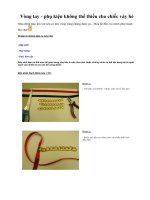Tài liệu Why Should Auto Dealers Use the Internet to Sell More Cars? ppt
Bạn đang xem bản rút gọn của tài liệu. Xem và tải ngay bản đầy đủ của tài liệu tại đây (56.31 KB, 6 trang )
Business Case for Internet Sales Leads Dealix Corporation
Why Should Auto Dealers Use the Internet to
Sell More Cars?
Published by
Dealix Corporation
January 2004
Business Case for Internet Sales Leads Dealix Corporation
Why Should Automobile Dealers Utilize the Internet to Increase Car Sales?
The first place serious buyers go when shopping for a new vehicle is the Internet. A new study by
JD Power and Associates found that of the 64% of new-vehicle buyers use the Internet while
shopping for a car
1
, 88% will visit automotive Web sites before going into a dealership for a test
drive.
2
According to Julie Ask of Jupiter Media Metrix (JMM): “Nearly one in three new car purchases in
the U.S. will be an Internet-generated sale by 2006,” representing approximately 5.7 million cars,
or 32% of all new car deals.
Paul Taylor, chief economist with the National Automobile Dealers Association (NADA), agrees
that Internet sales are here to stay. "The Internet will continue to gain popularity as a device for
consumers to educate themselves about new cars and trucks," Taylor said. "Overall customer
satisfaction with the new car buying experience is up over the last two years and the Internet
is part of that achievement."
3
In fact, the top dealers in the nation have demonstrated that Internet leads have enabled them to
continue growing and gaining market share, even in challenging economic times. The Ward’s
Dealer Business top 100 e-dealers, those dealers that best utilize the Internet to sell cars, sold
22% more vehicles in 2002 than 2001 and sold 33% more vehicles in 2001 than 2000.
Local auto dealers, like Bill Frysinger of Gettel SuperCenter in Sarasota, Florida, agree that car
buyers are going online when they want to buy cars, “The volume of Internet sales is continuing
to increase. As the younger people get of buying age, I’d expect them to buy more and more
things online, including automobiles.”
1
/>43&siteid=26
2
3
1 Dealix Corporation
Business Case for Internet Sales Leads Dealix Corporation
Offline Auto Dealers Partner with Automotive Internet Companies
In the recent past, some believed that Internet retailers posed a threat to their brick and mortar
counterparts, as some Internet-based automotive companies poised themselves to take over the
offline retail auto industry. After the dotcom meltdown, however, retail dealerships still stand, and
the Internet serves as a fundamental channel that enhances, rather than erodes, the way offline
dealers do business. For automotive dealers and manufacturers, the Internet serves as a tool that
provides access to consumers who are essentially waving their hands and saying, “Hey, I am
interested in this car. I want to know more!”
According to the study by J.D. Power, an automotive Internet user visits an average of seven
different Web sites before making a purchase.
4
Julie Ask of JMM confirms, “Consumers still
perceive third-party auto sites to be more impartial and innovative, offering tools, chat rooms, and
a breadth of links to services that were only recently adopted by some manufacturers.”
Today, brick and mortar retail dealerships work in tandem with automotive Internet companies to
sell more cars. While the Internet is the first place consumers go when they want to buy a car,
their final step takes place in the showroom, when they get to take it out for a test drive.
Get a Higher Return on Your Advertising Investment Using Internet Sales Leads
While auto dealers spend hundreds of thousands of dollars on traditional advertising, they still
have no precise way of measuring whether consumers are actually paying attention. On average,
auto dealers spend $550 on traditional advertising per one car sold, while the average cost per
car sold using Internet advertising is only $200.
Average Advertising Cost per Car Sold:
Traditional Advertising - $600
Internet - $200
4
2 Dealix Corporation
Business Case for Internet Sales Leads Dealix Corporation
Despite these resounding numbers, many auto dealers still dedicate only a fraction of their
advertising budgets to Internet-generated leads. According to NADA, in 2001, the average
dealership generated 13% of new car sales from Internet leads, but dedicated only 5% of its
advertising budget to Internet marketing and advertising.
5
However, investments in Internet
marketing have been steadily increasing over the past few years. According to research firm
Competitive Media Reporting, since 1996, the auto industry has been increasing its expenditures
on Internet advertising and marketing on average by 53% per year.
6
Auto Dealer Advertising Budgets
Newspapers
53%
Radio
14%
T.V.
14%
Direct Mail
6%
Internet
5%
Other
8%
5
6
3 Dealix Corporation
Business Case for Internet Sales Leads Dealix Corporation
Dave Kalmus, Internet Sales Manager (ISM) at Trans Ocean Volkswagen in Pasadena,
California, recognizes the Internet as a cost-effective lead producer: “To be honest with you, we
don’t do a lot of newspaper advertising,” said Kalmus. “It’s very costly. We do pull a lot of the local
people regardless if we advertise in the paper or not. With the Internet, however, it does bring
people from greater distances. These people might never have dreamed of coming to our
dealership.”
Utilizing the Internet as a marketing tool allows offline dealers access to savvy, serious car
shoppers – not just a passive audience watching a television commercial or listening to a radio
ad. “These shoppers are a lot more knowledgeable. They know more about cars than I do. They
have all the time in the world to study every car online,” said Jim Povio of Redwood City Dodge in
Redwood City, California.
In addition, unlike broadcast and offline print ads, Internet leads provide precise information about
consumers and their preferences. The automotive Internet company can then filter and verify this
data so dealerships receive a higher quality lead with a greater probability of ending in a sale.
It’s clear that Internet-generated sales leads are the efficient means for dealers to gain access to
interested customers. While traditional ads require up-front payment with no guarantee of
customer response, the Internet lead model is a performance-based system: you pay for the
leads, not just the advertisement.
Dealerships Expand Their Sales Territories with Internet Leads
Internet leads generate sales revenue that would not otherwise be captured on the showroom
floor. Some customers simply live too far away from dealerships, while others may be unaware
of a particular store without being referred by a lead provider.
“I definitely saw that we could expand our range of business from 10 to 30 miles,” said Tom Stall
of Bob Stall Chevrolet in La Mesa, California. Stall confirms the Internet has allowed him to triple
the size of his typical sales territory: “People who won’t shop in person will shop electronically.”
His Internet sales team currently handles 500 leads per month, representing 15% of Bob Stall
Chevrolet’s customers. “We’re definitely getting people who normally wouldn’t shop us,” said
Stall.
Bill Frysinger of Gettel SuperCenter in Sarasota, Florida agrees, “We’re attempting to reach out
beyond our normal market to get some incremental business. That’s why the radius that we use
with Dealix is beyond our normal market.” In addition to the Sarasota market, Frysinger requests
leads from a 50-mile radius beyond Sarasota: car shoppers from Tampa in the north to Fort
Myers in the south.
By the same token, auto dealers can utilize Internet leads to defend their existing sales territories.
Because the Internet has liberated consumers from being geographical captives, dealers should
avoid the unrealistic belief that locals will automatically shop at their dealerships. Just as Internet
leads can enable dealers to expand their sales territories, they also give dealers information on
the vehicle buyers who are in their own back yards. Equipped with this information, dealers can
provide relevant incentives to attract and maintain local clientele.
4 Dealix Corporation
Business Case for Internet Sales Leads Dealix Corporation
Internet Speed and Dealer Response Increase Closing Ratios
The speed at which Internet-based service companies generate leads keeps dealers on their
toes. A study by Aston Martin Jaguar Land Rover of North America (AMJLR) attests to how
critical it is for dealers to launch a quick response to hot Internet sales leads. AMJLR reported
that user-friendly Web sites and an immediate response to sales leads directly influenced
undecided car shoppers to buy AMJLR cars instead of other luxury vehicles. The study
concluded, “An incremental sale may be generated when a superior online shopping experience
is combined with a seamless transition to the offline retail purchase arena.”
Dealers Are Catching On
“The Internet is here to stay. There’s no doubt about that in my mind,” said Scott Smith, Internet
Sales Manager at Findlay-Nolte Honda in Kingman, Arizona. “Dealers don’t have to reinvent the
wheel when they pursue Internet leads; they simply have to find the right online partner.”
Given the latest trends in online car shopper behavior, it is essential that dealers re-evaluate their
advertising budgets to justify spending hundreds of thousands of dollars on print, broadcast, and
direct mail advertising channels while Internet leads, by comparison, are a bargain in terms of
price and conversion rates.
It’s clear that all signs point to the Internet as the premier starting point for serious car shoppers.
Smart dealers will want to catch them at the starting line.
5 Dealix Corporation









